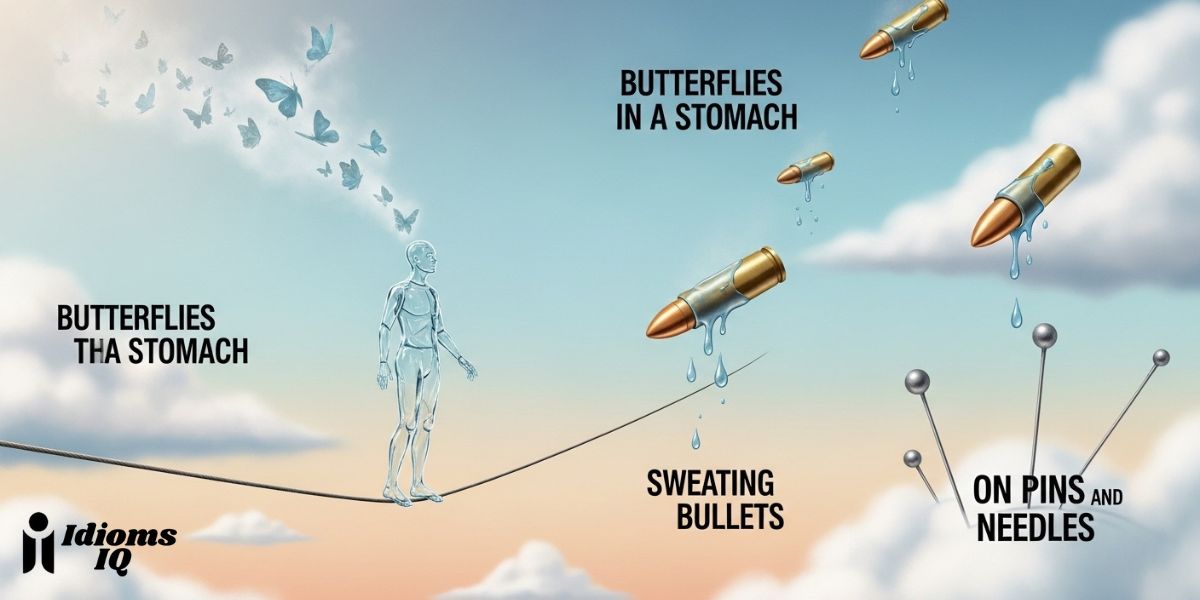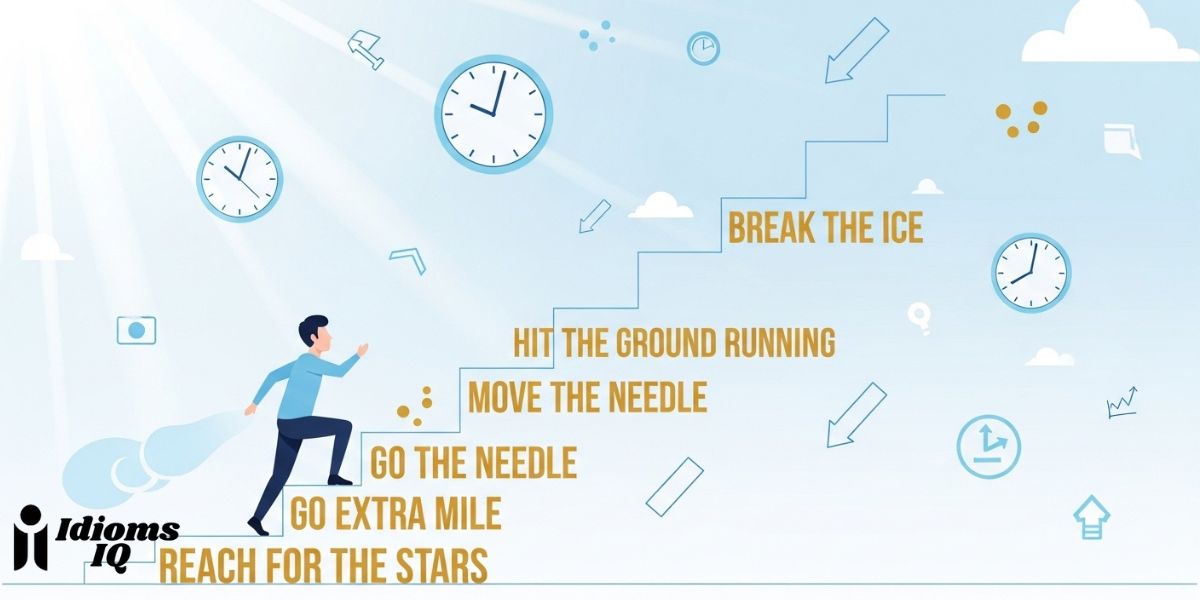
Language is a vibrant and dynamic tool, and among its most evocative figures of speech are idioms. These unique phrases, whose meanings cannot be deduced from the literal definitions of their individual words, offer a fascinating glimpse into the cultural nuances and shared experiences of a community. Idioms are more than just linguistic quirks; they are concentrated capsules of wisdom, emotion, and insight.
By understanding and using idioms, we don’t just expand our vocabulary; we deepen our comprehension of human nature and the world around us. They can transform ordinary conversations into engaging dialogues, inject humor or gravitas into our writing, and inspire deeper thinking. Embracing these 35 idioms for nervousness allows us to articulate complex emotions or situations with precision and clarity, fostering a richer, more empathetic connection with others and a clearer understanding of life’s intricate tapestry.
Happiness often shines brightest when shared with others, especially close companions. If you love exploring how the English language adds color to our emotions, don’t miss our collection of idioms for best friends. After all, joy feels even more meaningful when expressed among true friends.
Idioms for Nervousness
Here are 35 powerful idioms for nervousness that vividly describe various aspects of anxiety and apprehension.
1. Butterflies in one’s stomach
- Meaning: This idiom describes a fluttering sensation in the stomach, indicating a feeling of nervousness or excitement, often before an important event.
- Use in a sentence: Before her job interview, she had butterflies in her stomach.
- Other ways to say it: Feeling queasy, stomach churning, feeling fluttery.
2. On pins and needles
- Meaning: This idiom means to be in a state of anxious suspense or eager anticipation, often feeling restless.
- Use in a sentence: We were all on pins and needles waiting for the exam results.
- Other ways to say it: On tenterhooks, in suspense, restless.
3. Have cold feet
- Meaning: This idiom means to feel nervous or hesitant about doing something one had planned, often at the last minute.
- Use in a sentence: He was about to propose, but at the last moment, he had cold feet.
- Other ways to say it: Get cold feet, lose courage, back out.
4. Break into a cold sweat
- Meaning: This idiom describes suddenly becoming very nervous or frightened, often accompanied by physical perspiration.
- Use in a sentence: The thought of public speaking makes me break into a cold sweat.
- Other ways to say it: Get clammy, feel terrified, get scared.
5. Have one’s heart in one’s mouth
- Meaning: This idiom means to feel extremely nervous or frightened, as if one’s heart is pounding so hard it’s about to jump out.
- Use in a sentence: When the car swerved, my heart was in my mouth.
- Other ways to say it: Terrified, petrified, extremely scared.
6. Shake like a leaf
- Meaning: This idiom describes trembling uncontrollably due to extreme nervousness, fear, or cold.
- Use in a sentence: Before her performance, she was shaking like a leaf.
- Other ways to say it: Trembling, quivering, shivering.
7. Get the jitters
- Meaning: This idiom means to feel suddenly nervous or anxious, often with slight trembling or restlessness.
- Use in a sentence: He always gets the jitters right before a big presentation.
- Other ways to say it: Feel fidgety, get nervous, feel anxious.
8. Be on edge
- Meaning: This idiom means to be nervous, irritable, or easily agitated, often due to stress or anticipation.
- Use in a sentence: She’s been on edge all week waiting for the test results.
- Other ways to say it: Tense, irritable, highly strung.
9. Nail-biting
- Meaning: This idiom describes a situation that is very tense, exciting, or suspenseful, causing one to feel nervous.
- Use in a sentence: The end of the game was a nail-biting finish.
- Other ways to say it: Tense, suspenseful, thrilling.
10. Walk on eggshells

- Meaning: This idiom means to be extremely careful and cautious in one’s actions or words to avoid upsetting someone or causing trouble, often due to nervousness about their reaction.
- Use in a sentence: Everyone in the office was walking on eggshells around the angry boss.
- Other ways to say it: Be very careful, be cautious, tread lightly.
11. Have a knot in one’s stomach
- Meaning: This idiom describes a tight, uncomfortable feeling in the stomach due to anxiety or nervousness.
- Use in a sentence: He had a knot in his stomach before asking for a raise.
- Other ways to say it: Stomach churn, feel queasy, stomach clenching.
12. Feel a lump in one’s throat
- Meaning: This idiom describes a sensation of tightness or obstruction in the throat, often caused by strong emotion like sadness or nervousness, making it hard to speak.
- Use in a sentence: As she stood to give her speech, she felt a lump in her throat.
- Other ways to say it: Choked up, unable to speak, emotional blockage.
13. Be a bundle of nerves
- Meaning: This idiom describes someone who is extremely nervous and anxious, often visibly so.
- Use in a sentence: Before the wedding, the groom was a complete bundle of nerves.
- Other ways to say it: Nervous wreck, very anxious, highly strung.
14. Fidget
- Meaning: This idiom describes making small, restless movements with one’s hands or feet due to nervousness or impatience.
- Use in a sentence: He always starts to fidget when he’s feeling uncomfortable.
- Other ways to say it: Restless, squirm, twitch.
15. Pace back and forth
- Meaning: This idiom describes walking repeatedly back and forth in a small area, often as a sign of nervousness, anxiety, or deep thought.
- Use in a sentence: The expectant father paced back and forth in the waiting room.
- Other ways to say it: Restless walking, anxious movement, agitated pacing.
16. Tremble
- Meaning: This idiom means to shake involuntarily, typically as a result of anxiety, excitement, or weakness.
- Use in a sentence: Her hands began to tremble as she opened the important letter.
- Other ways to say it: Quiver, shake, shiver.
17. Have clammy hands
- Meaning: This idiom describes having hands that are cold and sweaty due to nervousness or fear.
- Use in a sentence: Before his first date, he noticed he had clammy hands.
- Other ways to say it: Sweaty palms, cold sweat, moist hands.
18. Be a nervous wreck
- Meaning: This idiom describes someone who is extremely anxious, stressed, and exhausted due to prolonged nervousness.
- Use in a sentence: After weeks of worrying, she was a nervous wreck.
- Other ways to say it: Bundle of nerves, highly stressed, emotionally drained.
19. Be ill at ease
- Meaning: This idiom means to feel uncomfortable, awkward, or anxious in a situation.
- Use in a sentence: He was clearly ill at ease during the formal dinner.
- Other ways to say it: Uncomfortable, uneasy, awkward.
20. Have stage fright

- Meaning: This idiom describes nervousness or anxiety experienced by a performer before appearing in front of an audience.
- Use in a sentence: Despite years of acting, she still gets stage fright before every show.
- Other ways to say it: Performance anxiety, pre-show jitters, audience apprehension.
21. Get weak in the knees
- Meaning: This idiom describes feeling suddenly faint, unsteady, or overwhelmed, usually due to fear, excitement, or strong emotion.
- Use in a sentence: The sight of blood always makes me get weak in the knees.
- Other ways to say it: Feel faint, feel unsteady, overwhelmed.
22. Be on tenterhooks
- Meaning: This idiom means to be in a state of anxious suspense or eager anticipation, often feeling restless. (Similar to “on pins and needles”).
- Use in a sentence: The whole family was on tenterhooks waiting for the doctor’s call.
- Other ways to say it: In suspense, on edge, restless.
23. Be shaky
- Meaning: This idiom describes feeling unsteady, weak, or trembling, often due to nervousness, fear, or illness.
- Use in a sentence: After the near-accident, his hands were still shaky.
- Other ways to say it: Trembling, unsteady, quivering.
24. Have one’s stomach churn
- Meaning: This idiom describes an uncomfortable, uneasy sensation in the stomach, often associated with anxiety or disgust.
- Use in a sentence: The thought of the difficult conversation made her stomach churn.
- Other ways to say it: Feel queasy, stomach knot, butterflies.
25. Feel queasy
- Meaning: This idiom means to feel nauseous or slightly sick, often caused by nervousness or anxiety.
- Use in a sentence: The roller coaster made me feel queasy.
- Other ways to say it: Nauseous, sick to one’s stomach, uneasy.
26. Have one’s palms sweat
- Meaning: This idiom describes experiencing sweaty palms, a common physical symptom of nervousness or anxiety.
- Use in a sentence: Every time he had to speak in public, he noticed his palms would sweat.
- Other ways to say it: Clammy hands, sweaty hands, perspiring palms.
27. Be on the anxious side
- Meaning: This idiom describes someone who tends to be generally nervous or worried, rather than a temporary state.
- Use in a sentence: She’s always been a bit on the anxious side when it comes to travel.
- Other ways to say it: Prone to worry, easily anxious, naturally nervous.
28. Lose one’s cool
- Meaning: This idiom means to become agitated, angry, or flustered, losing one’s composure due to stress or pressure.
- Use in a sentence: Under the intense scrutiny, the politician started to lose his cool.
- Other ways to say it: Get flustered, become agitated, lose composure.
29. Be jumpy
- Meaning: This idiom describes being easily startled or nervous, often reacting suddenly to small things.
- Use in a sentence: After watching the horror movie, she was jumpy all night.
- Other ways to say it: Skittish, easily startled, nervous.
30. Be apprehensive

- Meaning: This idiom means feeling anxious or fearful that something bad or unpleasant will happen.
- Use in a sentence: He was apprehensive about the upcoming surgery.
- Other ways to say it: Worried, uneasy, fearful.
31. Have a sinking feeling
- Meaning: This idiom describes an unpleasant sensation in the stomach or chest, indicating a growing sense of dread or disappointment.
- Use in a sentence: As the plane began to shake, I had a sinking feeling in my stomach.
- Other ways to say it: Sense of dread, foreboding, growing fear.
32. Bite one’s nails
- Meaning: This idiom describes a common nervous habit, indicating anxiety, stress, or deep thought.
- Use in a sentence: He started to bite his nails as the deadline approached.
- Other ways to say it: Anxious habit, nervous fidget, stress reliever.
33. Be in a cold sweat
- Meaning: This idiom means to be in a state of intense fear or anxiety, often causing one to perspire heavily. (Similar to “break into a cold sweat”).
- Use in a sentence: He woke up in a cold sweat after the nightmare.
- Other ways to say it: Terrified, panicking, drenched in fear.
34. Have a frog in one’s throat
- Meaning: This idiom describes a temporary hoarseness or difficulty speaking, often due to nervousness or a dry throat.
- Use in a sentence: He cleared his throat, feeling a frog in his throat before his speech.
- Other ways to say it: Hoarse, croaky, difficulty speaking.
35. Be on tenterhooks (re-emphasized for common usage)
- Meaning: This idiom means to be in a state of anxious suspense or eager anticipation, often feeling restless.
- Use in a sentence: The whole family was on tenterhooks waiting for the doctor’s call.
- Other ways to say it: In suspense, on edge, restless.
Fill-in-the-Blank Exercise: Idioms for Nervousness
Complete the following sentences with the most appropriate idiom from the article.
- Before her first solo performance, she had ______________.
- We were all ______________ waiting for the jury’s verdict.
- He almost backed out of the skydiving trip because he ______________.
- The thought of speaking in front of hundreds of people makes me ______________.
- When the roller coaster suddenly dropped, my ______________.
- The new manager was so strict that everyone in the team felt like they were ______________ around him.
- She always ______________ before job interviews, even though she’s highly qualified.
- He started to ______________ as the crucial moment of the game approached.
- The sudden loud noise made her ______________ for the rest of the evening.
- Despite all the rehearsals, the actor still gets a bad case of ______________ before every show.
Answer Key: Fill-in-the-Blank Exercise
- butterflies in her stomach
- on pins and needles
- had cold feet
- break into a cold sweat
- heart was in my mouth
- walking on eggshells
- gets the jitters
- shake like a leaf
- jumpy
- stage fright
Conclusion
Idioms are far more than mere linguistic embellishments; they are powerful tools that enrich our communication and deepen our understanding of the world around us. By engaging with these unique expressions, particularly idioms for nervousness, we not only enhance our vocabulary but also cultivate a more nuanced appreciation for the subtle connections between abstract concepts and concrete sensations.
Practicing the usage of idioms can significantly improve both our writing skills and descriptive abilities, allowing us to convey complex emotions and observations with greater clarity, conciseness, and impact. Furthermore, the process of deciphering and applying idioms sharpens our cognitive abilities, encouraging us to think beyond literal interpretations and connect with the underlying observations they encapsulate. Embracing idioms is an invitation to explore the richness of language and, in so doing, to communicate with greater precision and confidence.






